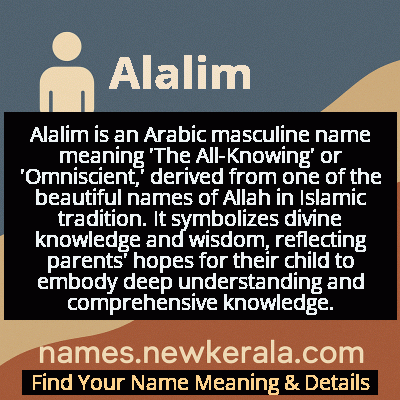Alalim Name Meaning & Details
Origin, Popularity, Numerology Analysis & Name Meaning of Alalim
Discover the origin, meaning, and cultural significance of the name ALALIM. Delve into its historical roots and explore the lasting impact it has had on communities and traditions.
Name
Alalim
Gender
Male
Origin
Muslim
Lucky Number
3
Meaning of the Name - Alalim
Alalim is an Arabic masculine name meaning 'The All-Knowing' or 'Omniscient,' derived from one of the beautiful names of Allah in Islamic tradition. It symbolizes divine knowledge and wisdom, reflecting parents' hopes for their child to embody deep understanding and comprehensive knowledge.
Alalim - Complete Numerology Analysis
Your Numerology Number
Based on Pythagorean Numerology System
Ruling Planet
Jupiter
Positive Nature
Optimistic, inspirational, and creative.
Negative Traits
Scattered, exaggerating.
Lucky Colours
Yellow, gold, purple.
Lucky Days
Thursday.
Lucky Stones
Yellow sapphire.
Harmony Numbers
1, 2, 9.
Best Suited Professions
Arts, writing, communication.
What People Like About You
Creativity, optimism.
Famous People Named Alalim
Alalim Al-Mansur
Islamic Scholar
Renowned theologian and philosopher who wrote extensively on divine knowledge and human understanding
Alalim Al-Hakim
Judge and Jurist
Prominent Maliki jurist known for his encyclopedic knowledge of Islamic law and fair judgments
Alalim Al-Farisi
Physician and Scientist
Pioneering physician who compiled medical knowledge from Greek, Persian, and Indian traditions
Alalim Al-Qurashi
Poet and Linguist
Celebrated Arabic poet known for his mastery of language and profound philosophical verses
Name Variations & International Equivalents
Click on blue names to explore their detailed meanings. Gray names with will be available soon.
Cultural & Historical Significance
In Muslim societies, naming a child Alalim represents parents' aspirations for their child to embody wisdom, deep understanding, and comprehensive knowledge. The name carries the cultural weight of Islamic scholarly traditions, where pursuit of knowledge ('ilm') is considered a religious duty. Historically, this name has been particularly popular among scholarly families and in regions with strong traditions of Islamic education, serving as a constant reminder of the importance of seeking knowledge throughout one's life.
The name also reflects the Islamic concept of Tawhid (divine unity), where human attributes are understood as reflections of divine qualities. By naming a child Alalim, parents acknowledge that all true knowledge ultimately comes from God while encouraging the child to become a vessel through which divine wisdom can manifest in the world. This cultural practice underscores the Islamic view that knowledge should be pursued not just for worldly benefit but as a means of drawing closer to the Divine.
Extended Personality Analysis
Individuals named Alalim are typically characterized by their intellectual curiosity and profound depth of understanding. They possess a natural inclination toward learning and analysis, often displaying remarkable memory and attention to detail. These individuals tend to be contemplative, patient, and methodical in their approach to problems, preferring to gather comprehensive information before making decisions. Their wisdom often makes them sought-after advisors and respected figures in their communities.
Alalims are known for their calm demeanor and ability to see situations from multiple perspectives. They exhibit strong analytical skills and often excel in academic or research-oriented fields. While they may appear reserved initially, they demonstrate deep empathy and understanding once engaged. Their pursuit of knowledge is not merely intellectual but often spiritual, seeking to understand the deeper meanings behind phenomena.
These individuals typically display excellent judgment and are rarely impulsive in their actions. They value truth and accuracy, often becoming champions of factual information in their social circles. Their comprehensive understanding allows them to connect seemingly unrelated concepts, making them innovative problem-solvers. Despite their intellectual strengths, genuine Alalims remain humble, recognizing that true wisdom involves acknowledging the limits of one's knowledge while continuously seeking to expand it.
Modern Usage & Popularity
In contemporary times, Alalim remains a meaningful though relatively uncommon name choice among Muslim families, particularly those with strong religious and educational values. The name has seen consistent usage in scholarly communities and among families with traditions of Islamic learning. While not among the most popular Muslim names, it maintains a steady presence in countries like Malaysia, Indonesia, Pakistan, and parts of the Middle East. Modern usage often reflects parents' desire to instill values of knowledge-seeking and wisdom in their children, with the name serving as a constant reminder of these ideals. Recent trends show slight increases in usage among educated urban Muslim families who appreciate both its traditional significance and unique quality. The name is particularly favored by parents in academic professions or those who value intellectual pursuits, serving as an aspirational namesake that encourages lifelong learning and spiritual growth.
Symbolic & Spiritual Meanings
Symbolically, Alalim represents the human aspiration toward comprehensive understanding and divine wisdom. The name embodies the concept that true knowledge encompasses both the apparent and hidden aspects of existence. It symbolizes the bridge between human limited understanding and divine omniscience, serving as a reminder that the pursuit of knowledge is a sacred journey. Metaphorically, it represents the light of understanding that dispels ignorance, the depth that gives meaning to surface observations, and the integration of various forms of knowledge into a cohesive whole. The name carries the symbolic weight of being a vessel through which divine attributes of knowledge can be reflected in human form, emphasizing that while humans can never achieve absolute omniscience, the continuous seeking of knowledge represents our highest spiritual and intellectual calling.

